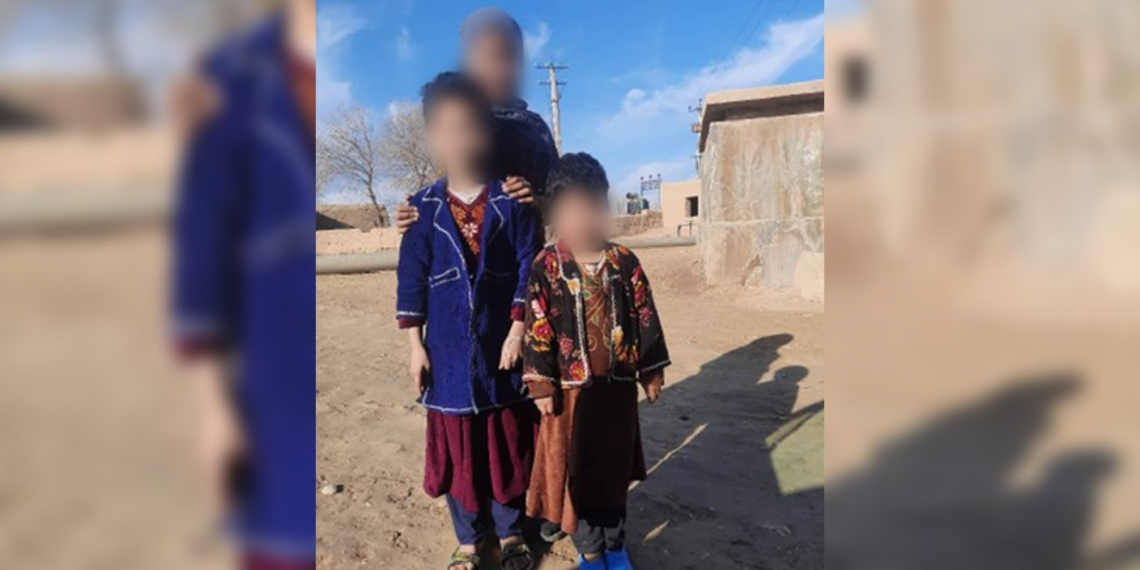By Ziba Balkhi
Sofia says her biggest dream is to read and write. But that might be impossible.
The 12-year-old lives in the village of Saltaq Khord Turkmania, an area in Jawzjan province’s Khwaja Du Koh district, where there are no schools for girls.
“My parents do not have any issue with me going to school. But there isn’t a school for girls in our village,” Sofia says.
“I like to study and go to school. But in our village, all the girls are uneducated.”
Sofia looks at the ground while twirling her fingers.
“I can’t read or write anything. I don’t even know how to write my name,”
Residents say no girl in the village of about 400 families has ever attended school.
Pre-Taliban authorities blamed for lack of schools
Tribal and local elders in the region blame authorities. They say there’s never been any support to build the school in the village including under the previous government the republic, before the Taliban took control and banned girls education.
“The reason girls don’t go to school is that we don’t have and never had a school for girls. I don’t understand why they didn’t build one. We’re also part of this country. The girls of our village are also the girls of this country,” says a resident, on condition of anonymity.
“During the previous government, authorities talked with some tribal elders during the republic to solve this issue, but our voices were never heard at that time.”
“We tried a lot. Several times we suggested to NGOs to build at least one elementary school so that our girls could study, but none of them acted. We are still waiting for them.
The resident says families support girls’ education.
“The people of our village like their daughters to study. I have four daughters, none of them have gone to school. It’s so disturbing to me.”
There are no records of exactly how many girls and women have been deprived of education in the region.
Generational illiteracy across both genders
But local elder Ghawsuddin*, 67, says that the lack of a girls’ school meant several generations remained illiterate.
“Believe God, we went to the head of education in Jawzjan with the chairman of the council and other elders of the tribe because of this problem. Even the representatives of our village went to Kabul and raised our problem and asked them to build a girls’ school in our village, they did not listen. They didn’t build a school,” Ghawsuddin says.
Now they are resigned to it remaining a dream.
“This government of the emirate [the Taliban], which is against the education of girls, won’t build schools for girls,” he says.
Ghawsuddin has three daughters himself, none of whom have been to school. He says there are no cultural restrictions against girls from the people in the region.
“We are blind [uneducated] people. I am not literate myself. My daughters are not literate. To whomever my message reaches, please build a girls’ school here. So that future generations will not be illiterate,” he says.
Most girls turn to carpet weaving
Ayesha, 16, who’s never been to school, says that the girls in the village take up carpet weaving instead of school as soon as they are old enough.
She dreams of studying and to teach others some day.
“Our relatives live in Jawzjan city. When I go to their house and see their daughters who are educated and studying, I wish I could study too,” she says.
“If you ask the girls of our village about their dreams, they have very small dreams. That is, to get familiar with reading and writing.”
“If one day a school is built in our village, I would like to become a teacher so that I can teach other girls and no girl in our village will remain uneducated.”
After the Taliban took power in August 2021, the group’s first move was to close girls’ schools and ban girls’ education above the sixth grade.
But in Saltaq Khurd Turkmania, there is not even a primary school.
Village elder Nasir*, whose daughters grew up without education, says he feels ashamed about it.
“When someone from an NGO comes and asks about the education of the female class, I am very ashamed to tell them. There is not a single female in our village who is literate.”
A brief sliver of schooling before funding dried up
He says that a local class was set up in their village for girls by the Youth Health and Development organization last year. But that class stopped when the project funding ran out.
“Everyone sent their daughters to that class with enthusiasm to at least learn to read and write. Although the class did not have a capacity of more than 30 girls. But the families said, ‘It’s okay, it’s not a problem, they don’t give us facilities, they don’t give us pens and books, they only give lessons for our girls. That’s enough’,” he says.
Under the program, a teacher travelled from the city to teach the girls, but the work only lasted seven months.
“Even now, those young girls who were studying ask me, ;What happened to our school? When is our teacher coming?’ But I have nothing to say. I am very ashamed of this situation,” he says.
Nasir despairs that more out of reach than ever under Taliban rule.
“At the time of the Republic, I tried as much as possible to establish a girls’ primary school for us. But it didn’t happen. Unfortunately, during the Islamic Emirate, we did not even give it a shot. The Taliban do not allow many things here. Our only hope is for an NGO to build a school here,” he says.








